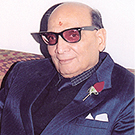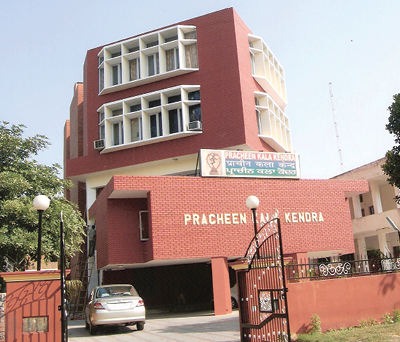

Chandigarh, the city-Union Territory sandwiched between the North Indian states of Punjab and Haryana, has a chequered history. The City, which is known for its urban design, water bodies, gardens, architecture and the shopping hub of Sector 17, was created by the legendary French architect Le Corbusier in the early 1950s. Le Corbusier conceptualised this modern city with wide roads connecting the central axis (commercial centre) and its arms (residential sectors). Chandigarh gained worldwide attention for its modern infrastructure, especially when the western print media compared this city to scores of unplanned cities bursting at the seams in a newly independent country. Around the same time, working silently and effectively, was a genial dancer visionary, Madan Lal Koser, who in his own style and pace dotted Chandigarh on the cultural map of the world with the establishment of an institution of excellence - The Pracheen Kala Kendra (Centre of Ancient Arts). M.L. Koser should rightly be placed on the same pedestal, in the league of extraordinary achievers, as Le Corbusier.
M.L. Koser, born in Gujranwala (now in Pakistan), was deeply interested in dance. Despite family opposition, he spent years learning dance under eminent gurus - Sudhakar, Uday Shankar and Namudri. Not only did Koser submerge himself in the learning of the Tandav style, he also acquired proficiency in Kathak, Bharatanatyam and Manipuri. While barely out of his teens, Koser established his own dance troupe. His depiction of historical themes, most of them illustrating the sorrow, conflict and pain of Indian modern post-partition historical events, caught the eye of connoisseurs. Koser also presented a famous ballet on Pandit Nehru’s ‘Discovery of India’. Koser performed for many years, and his audience included Presidents, Prime Ministers, Chief Ministers, Diplomats and visiting Heads of States and Government. Koser was also a mentor to young dancers, and set up an institution at Chandigarh to help ‘strugglers’. Koser was also a leading dance critic, and was published in Hindi, English and Urdu journals and newspapers. He received many national accolades and awards, and has left behind an unparalleled legacy as a dancer, administrator, mentor and a cultural icon. He died in 2008. Koser’s greatest contribution was the establishment of the Pracheen Kala Kendra. Ably supported by his wife, Shobha Koser, a renowned Kathak exponent herself, Koser embarked upon setting up the Kendra in 1956, in Chandigarh. It was to be a philanthropic organisation dedicated to the preservation and nurturing of Indian performing arts and culture - especially Indian Classical music and dance. Today, the Pracheen Kala Kendra is the premier cultural institution of the country, with four campuses and 3,500 affiliated centres in India and abroad. The diplomas awarded by the Kendra are recognised as equivalent to graduation and post-graduation degrees awarded by universities, courtesy a landmark Supreme Court verdict in 1997.
Koser understood that most learners of music and dance came from modest backgrounds, and not many of them reached the highest echelons of fame in their fields. Koser realised that they would need regular employment in schools, colleges and institutions. Many dancers during his time suffered from lack of education and paucity of funds, and so were unable to pursue their art. Koser desired to remedy this. Pracheen Kala Kendra has institutionalised Indian Classical music and dance and has converted it from its social, cultural, religious and mythological sphere of activity and practice, to an institution-based subject discipline. Pracheen Kala Kendra also organises seminars, programmes, symposiums and workshops on dance, in addition to inviting prominent artistes to perform at its premises. Pracheen Kala Kendra has also evolved as a centre for cultural research. Now, helmed by the Kosers’ illustrious son, Sajal, the Kendra is expanding itself and unfurling its wings in remote areas of the country. The credit for the success of Pracheen Kala Kendra also goes M.L. Koser’s wife, Shobha, a renowned Kathak danseuse who trained under the Jaipur Gharana gurus. Shobha has nurtured Kathak dance over six decades, and her dance focuses on Nritta and Abhinaya Bhava. Her disciples have repaid her efforts by setting up dance centres abroad. Shobha continues to enthrall the audience with her performances and her ‘bhava’ (expressive depictions) still captivates the viewers. Though extremely busy with the administration of the Kendra, which educates a mind-boggling 300,000 students, Shobha still has the energy and zeal to set examination papers and organise programmes and seminars, staying true to M.L. Koser’s philosophy of ‘keeping oneself grounded’. Shobha has admitted that, due to the paucity of time, she wakes up in the night to do her ‘riyaaz’ (daily practice). Shobha has been honoured with numerous national awards, the latest being the Lalit Arpan Samman Lifetime Achievement Award 2014. Shobha sums up the journey very effectively: “I made a pattern for my life and I go on following it”. M.L. Koser and Shobha Koser, the most modest and humble of heroes, have etched their incomparable credentials among India’s greatest cultural and institutional icons.
The Writer is a renowned Kuchipudi Danseuse and Choreographer
Read More...